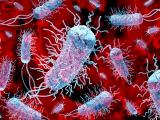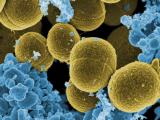Aug 30, 2010 (CIDRAP News) The US Department of Health and Human Services (HHS) has awarded a contract to a San Francisco company to further the development of a new broad-spectrum antibiotic for treating plague, tularemia, and various resistant infections.
The contract, awarded to Achaogen Inc., is worth $27 million in the first 2 years and can be extended annually for up to 3 additional years, for a total of $64 million, HHS's Biomedical Advanced Research and Development Authority (BARDA) announced today. The experimental antibiotic is called ACHN-490.
Plague and tularemia are among the diseases that bioterrorists are considered likely to try to spread. Besides targeting those diseases, ACHN-490 "could treat many infections that are becoming resistant to antibiotics," BARDA said in a news release.
"This new antibiotic is part of our push against antibiotic resistance for certain bacterial infections, and at the same time could provide a new treatment for plague and tularemia biothreats," BARDA Director Dr. Robin Robinson said in the release. "It's the first time BARDA research and development funds have been used in a multi-use approach like this."
BARDA said the contract is in line with the government's new approach to developing medical countermeasures for biological and other threats, described in a report released earlier this month. The report called for developing drugs useful against both biological weapons and common illnesses and for providing countermeasures that can be used in children, the elderly, and other vulnerable groups, the agency noted.
The release said the contract will cover studies to assess the drug's safety in children and other vulnerable populations. The statement gave little other information on the activities funded by the contract, and no additional details were immediately available from HHS or Achaogen officials today.
Information on Achaogen's Web site says ACHN-490 is active against a variety of resistant pathogens, including methicillin-resistant Staphylococcus aureus (MRSA) and gram-negative species such as Escherichia coli, Klebsiella pneumoniae (including K pneumoniae carbapenemase), and Pseudomonas aeruginosa.
According to a slide presentation available on the company site, the drug has broad activity against carbapenem-resistant pathogens in the Enterobacteriaceae family. Recently concern has been raised about a resistance factor called NDM-1 (or New Delhi metallo-beta-lactamase 1), which renders Enterobacteriaceae resistant to carbapenem and many other antibiotics. The Achaogen information is unclear on whether ACHN-490 would be active against NDM-1 carriers. It states, "NDM-carrying strains with both metallo-beta-lactamase and methyltransferase display resistance to ACHN-490," but adds that such strains are uncommon.
Achaogen has completed phase 1 safety and dose-ranging studies of ACHN-490 and will be presenting the results of one phase 1 study at a conference in September, according to the slide presentation. A phase 2 study is under way.
BARDA said the Achaogen contract is the first awarded under the agency's Broad Spectrum Antimicrobial Program, one of six areas in which BARDA is using a contracting tool called a broad agency announcement. Such announcements help the agency identify innovative and promising biodefense technologies, the statement said.
See also:
Aug 30 BARDA news release
Achaogen page with access to slide presentation on ACHN-490
Aug 20 CIDRAP News story "Experts offer perspective on NDM-1 resistance threat"
Aug 19 CIDRAP News story "HHS sees greater federal role in building biodefense tools"



















